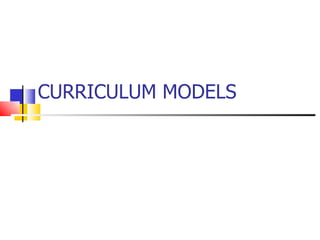
Curriculum models long
- 2. PRODUCT MODEL Also known as behavioural objectives model Some key theorists: Tyler (1949), Bloom (1965) Model interested in product of curriculum
- 3. 4 FUNDAMENTAL QUESTIONS What are aims and objectives of curriculum? Which learning experiences meet these aims and objectives? How can the extent to which these aims and objectives have been met be evaluated? How can these learning experiences be organised? (Adapted from Tyler 1949)
- 4. ADVANTAGES OF PRODUCT MODEL Avoidance of vague general statements of intent Makes assessment more precise Helps to select and structure content Makes teachers aware of different types and levels of learning involved in particular subjects Guidance for teachers and learners about skills to be mastered
- 5. CRITICISMS OF PRODUCT MODEL At lower levels, behavioural objectives may be trite and unnecessary Difficult to write satisfactory behavioural objectives for higher levels of learning. Specific behaviours not appropriate for affective domain Discourages creativity for learner and teacher Enshrines psychology and philosophy of behaviourism Curriculum too subject and exam bound
- 6. PROCESS MODEL Focusses on teacher activities and teacher’s role Student and learner activities (perhaps most important feature) Conditions in which learning takes place Key thinker Stenhouse (1975)
- 7. PROCESS MODEL Emphasis on means rather than ends Learner should have part in deciding nature of learning activities More individualised atmosphere Assumption that learner makes unique response to learning experiences
- 8. ADVANTAGES OF PROCESS MODEL Emphasis on active roles of teachers and learners Emphasis on learning skills Emphasis on certain activities as important in themselves and for “life”
- 9. DISADVANTAGES OF PROCESS MODEL Neglect of considerations of appropriate content Difficulty in applying approach in some areas (Process and Product model from Neary, M. (2002) Chapter 3)
- 10. Academic Classical humanist Subject-based (Content driven) Utilitarian Technocratic Progressive Vocational (objectives- Developmental driven pedagogy (process- driven)
- 11. Academic Classical Humanist Autonomy means learning seen as individual process Real element of autonomy is academic freedom achieved when one achieves expertise and masters discipline Process naturally disenfranchises those without expertise Elite decide what elements of knowledge constitute cultural capital and operate processes that admit or qualify those aspiring to join elite
- 12. Academic contd. Assessment: norm referenced, graded, externally imposed Teacher: decides on and gives access to knowledge which counts; ensures standards; transmits approved knowledge
- 13. Utilitarian Technocratic Vocational Autonomy expressed in terms of consumer choice rather than pedagogy Students exercise choices over courses or modules in market
- 14. Utilitarian contd. Assessment: competencies, traditionally single-level, criterion- referenced summative, with competencies broken down into many elements Teacher: guides students as to what to study, which commodity to choose
- 15. Progressive Developmental pedagogy Autonomy means self-directed learning Students negotiate with teachers to take control of learning Negotiation of tasks, participative pedagogic style
- 16. Progressive contd. Assessment: formative, personal, course-work based and open-ended Teacher: partners with student; shares in decisions about what to study and when
- 17. Academic/Utilitarian share: View of knowledge or learning experience as fixed entity determined by authority Student bound by larger essentials (subject knowledge or needs of employment)
- 18. Academic/Progressive share: Antipathy to marketisation and instrumentalism in curriculum
- 19. Utilitarian/Progressive share: Individual student ownership and responsibility for learning Broadly egalitarian approach to education (Ideological rivalries and alliances between 3 curricular models based loosely on Bates I, Bloomer M, Hodkinson P & Yeomans D (1998)
- 20. 4 CONCEPTIONS OF CURRICULUM The official curriculum The hidden curriculum The observed curriculum The curriculum-as-experienced Pollard & Triggs (1997)
- 21. THE OFFICIAL CURRICULUM “A planned course of study” Explicitly stated programme of learning States intended curriculum content Structures sequence and progression, framing content and course activities Designed to challenge students and match learning needs
- 22. HIDDEN CURRICULUM All that is learnt during school/college activities that is not a designated part of official curriculum What is “picked up” about eg role of teacher/learner, status, attitudes to learning Implicit, embedded in taken-for-granted procedures and materials May be unrecognised and often examined Can have profound effect on self image on students, and attitudes to education/other social groups
- 23. OBSERVED CURRICULUM What can be seen as taking place in classroom May be different from intended official curriculum
- 24. CURRICULUM-AS- EXPERIENCED The parts of the curriculum (official and hidden) that actually connect meaningfully with students Arguably only this aspect which has educational impact – rest is often forgotten!
- 25. VOCATIONAL CURRICULUM Characterised as: Experientially based in terms of content and teaching method Directly relevant to student needs Emphasis on core skills Marsh, 1997
- 26. VOCATIONAL CURRICULUM Orientation: Tend to be explicit in outcomes Selection of content has input from industry, government, community as well as educators Emphasis on student-centred learning Typically based on small units, separately assessed/certificated
- 27. ACADEMIC CURRICULUM 16-19 Perceived as educationally elite, high status, traditionally thought of as more challenging Classroom based Focus on knowledge of given subject area determined by subject experts Emphasis on end of course external exams At advanced level, free choice of subjects “A-level” curriculum dependent on institution Can reinforce inequalities Young & Leney (1997)
- 28. COMMUNITY EDUCATION Traditionally cultural and recreation subjects Often held in community venues Voluntary attendance Usually non-accredited, although accreditation increasing for funding purposes
- 29. BIBLIOGRAPHY Pollard, A. & Triggs, P. (1997) Reflective Teaching in Secondary Education. London: Continuum Young, M. & Leney, T. (1997) From A-levels to an Advanced Level Curriculum of the Future in Hodgson, A. & Spours, K. (eds) (1997) Dearing and Beyond. London: Kogan Page Marsh, C.J. (1997) Perspectives: Key concepts for understanding curriculum 1. London: Falmer Press
- 30. Bates I, Bloomer M, Hodkinson P & Yeomans D (1998) “Progressivism and the GNVQ: context ideology and practice” Journal of Education and Work, 11, 22, 109-25) Neary, M. (2002) Curriculum Studies in Post- Compulsory and Adult Education. Cheltenham: Nelson-Thornes. Chapter 3